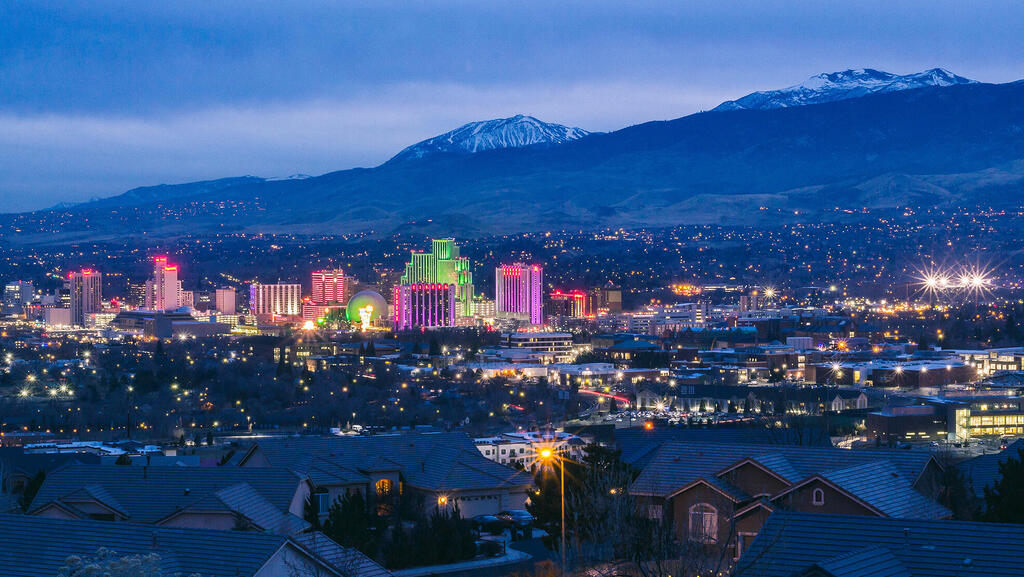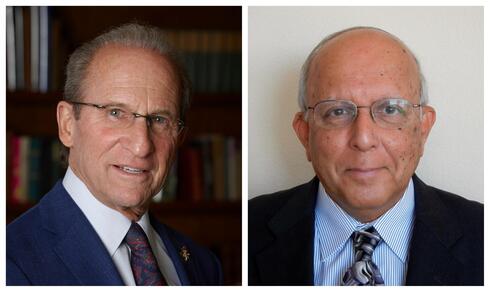
It’s time Israelis take a gamble on Nevada
The Silver State has Israelis passing by but new leadership is encouraging them to finally build some roots in the region
Nevada is perhaps best known for its flagship city Las Vegas, which has held a historic place in American culture for many decades. However, there have been recent efforts from businessmen and politicians on the ground to shed the reputation as a party state and solidify its place as a tech-friendly environment with close proximity to California but without the burdens of high taxes and cost of living.
“Nevada is a state far more high-tech than people realize,” said Nissim Ezekiel, Co-Founder of the Nevada Innovation Center (NIC). “There is a major tech corridor in the north of Nevada very close to the California border, but California has been increasingly a difficult state to do business because people move. When Tesla moved to Reno, that created a real massive tech corridor with global companies.” The Musk-owned company has a large presence in northern Nevada with its giga-factory, having invested $6.2 billion in Nevada and built a 5.4 million square foot factory since 2014. Since then, other tech companies have slowly started to follow.
The NIC was founded by Ezekiel and Michael Saltman with the help of Raphael Almagor, the Israeli link, in 2018. The first investment came through BIRD Grant to a joint Israel/Nevada partnership in infrastructure tech. Since then, it has become, it believes, the primary intermediary for networking and business initiatives linking Nevada’s economic development agencies, academic institutions, and private companies with Israel. It is technically a private LLC that first began its work by bringing Team Nevada to the Smart Mobility Summit in Tel Aviv in November 2018.
Since then, Israeli presence has grown in the state mainly taking advantage of its small government and positive regulatory climate for companies testing out technologies relating to autonomous vehicles, water management, and newer technologies like sports-tech (evident by Las Vegas becoming a sports city that hosts organizations like the NHL, NFL, and UFC - with Major League Baseball coming soon and NBA and MLS in active discussion).
According to figures provided by the NIC, there are 14 companies working on 16 projects with eight clients, such as the City of Las Vegas (CLV), the Las Vegas Metro Police Department (LVMPD), and the Las Vegas Convention & Visitors Authority (LVCVA). Israeli community engagement platform Zencity works with both the City of Las Vegas and the City of North Las Vegas, Nexar works with the Regional Transportation Commission of Southern Nevada, and smart soil sensing technology company Sensoil is active with WaterStart, a non-profit spun out of the Nevada Governor’s Office connecting tech companies with water agencies and deploying pilots for safer water.
Related articles:
In short, there’s a lot going on in Nevada. The state is open to more tech partnerships and Israeli companies have already started the process of expanding there. Despite this, one challenge the NIC sees itself facing is companies committing to a long–term physical presence in the region and not just using it as a flyover state to visit the odd convention.
“Companies come to Vegas for conventions a lot, hundreds of them. It’s every possible industry you could imagine,” Saltman said when describing the convention culture in Nevada. Each year the state holds conferences such as CES, one of the largest technology trade shows in the world, DEF CON, a well-known hacker and cybersecurity conference, and Money 20/20, a global event focused on the future of finance and technology. “But, they’re here for a few days and they pick up and they leave. They don't stay in Nevada because the brand of Nevada is weak.” Saltman describes CEOs when they visit the state as “mesmerized,” yet the struggle at the moment is converting that view of the state as an attractive place to “plant their flag and do business” and remove the red tape so the incentives to innovate and build can increase.
“There's no question that with our connections in Nevada, top to bottom, we have access across the board which could extradite the process for anyone who wants to get into any business, domestic or international. We have an ax to grind which is that we need to overcome this hump of the brand,” he added.
One of those connections is to the state governor himself, Joe Lombardo. Inaugurated into office earlier this year, the former law enforcement officer is often in communication with Saltman and Ezekiel expressing interest in elaborating on the diversity of the industrial bases in Nevada. As a Republican, Governor Lombardo is the first governor in five years to take on a largely Democrat-learning state House and Senate, putting him in a unique position to cut the red tape and speed up these processes (Republicans held all three state levels of government only twice in the last 30 years,
in 2015 and 2016).
Last month he set the record for the most vetoes issued in a single legislative session, rejecting 75 bills passed by the Democrat-controlled Legislature and ensuring the government remains small and attractive for domestic and international entrepreneurs to flourish within the state’s borders (Governor Lombardo was unavailable for comment for this piece).
“I can say with confidence that the governor is very internationally minded, he understands the importance of fostering very strategic international partnerships,” said Kris Sanchez, Deputy Director at Nevada Governor's Office of Economic Development (GOED). “He is very bullish on Nevada, he is willing to get out and visit with CEOs from across the world to learn more about their considerations, or how they approach the U.S. market and learn from them.”
According to the GOED, Israel was one of the first countries it approached in 2013 to facilitate trade missions, prioritizing Startup Nation typically in the realm of water management and desert-tech. The office is continuing close ties with Israeli institutions such as Ben Gurion University and is focused on “re-engaging” with the Israeli government and other organizations following a lack of physical trips due to the pandemic. “Much of what we have been focused on over the years is the idea of what Nissum and his team \[at the NIC\] are doing,” Sanchez continued. “Providing a bridge for Israeli companies to come in and mature technology and ultimately access the U.S. market. We think Nevada is in a very unique position to do that.”
Today, there are roughly 75,000 Jews living in Nevada - a relatively modest number compared to more traditional hubs like New York, New Jersey, or California. However, private and government bodies across the state are betting on new leadership in a post-pandemic world to speed up the pace of innovation by banking on low regulation and cost of living, yet promote its proximity to Silicon Valley, to boost its rank as a reputable region for Israel’s to do business in the U.S.
As Nevada undergoes a shift in economic and political leadership, it might be time for Israelis to consider going all-in on the Silver State.

